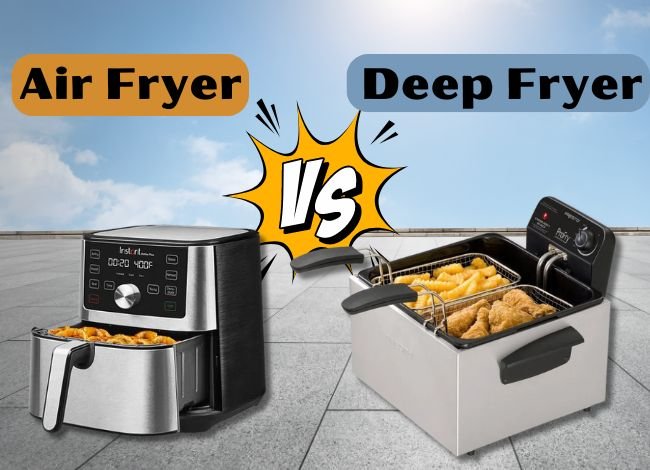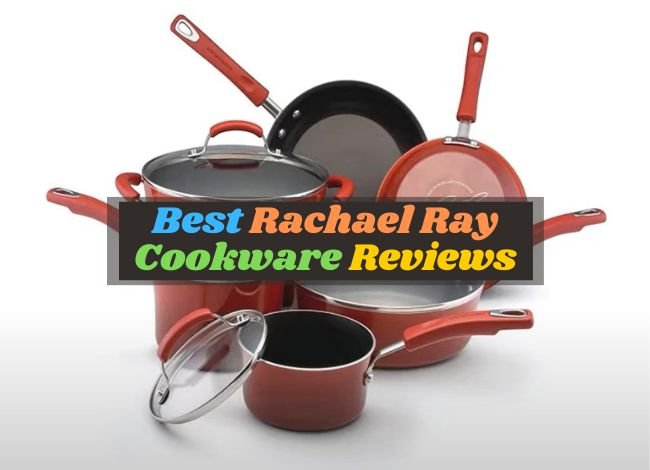Last Updated on March 27, 2024
The debate between air fryers and deep fryers is a hot topic in the culinary world. Each method offers distinct benefits and drawbacks. Understanding the differences between deep frying and air frying can help you make an informed decision on which is better for your cooking needs. Let’s delve into the specifics of each method.
What is Deep Frying?
Deep frying is a cooking technique where food is submerged in hot oil or fat, typically at temperatures between 350°F and 375°F. This method cooks food quickly, creating a crispy, golden exterior while keeping the interior moist. Deep frying is favored for its ability to cook a wide variety of foods, from French fries and chicken to doughnuts and tempura.
One of the main advantages of deep frying is the texture it provides. The high heat and oil contact ensure a uniformly crispy surface that many find appealing. Additionally, because the food is cooked rapidly, it can retain more moisture inside, resulting in a juicy product.
However, there are health concerns associated with deep frying. Foods cooked in this way tend to absorb a significant amount of oil, leading to higher calorie and fat content. This can be detrimental to heart health and contribute to weight gain if consumed frequently. Moreover, the repeated use of the same oil can lead to the formation of harmful compounds.
What is Air Frying?
Air frying is a modern cooking technique that uses hot air to cook food, mimicking the results of deep frying but with significantly less oil. An air fryer circulates hot air around the food at high speed, cooking it evenly and creating a crispy layer on the outside. This method requires little to no oil, making it a healthier alternative to traditional deep frying.
The primary benefit of air frying is the reduction in oil usage, which lowers the calorie and fat content of the cooked food. This can be a significant advantage for those looking to maintain a healthier diet without sacrificing the texture and taste they enjoy from fried foods. Additionally, air fryers are versatile, capable of baking, grilling, and roasting, offering a one-appliance solution for various cooking needs.
While air frying offers a healthier alternative, it’s not without its drawbacks. Some argue that air-fried foods don’t achieve the same level of flavor and crispiness as deep-fried items. Furthermore, the texture can sometimes be uneven, especially if the food is not turned or shaken during cooking. Lastly, air fryers can be expensive and take up a significant amount of counter space.
What is the Difference Between an Air Fryer and a Deep Fryer?
Air Fryers work by circulating hot air around the food, creating a crispy outer layer by the Maillard effect, similar to frying, but without the need for a large amount of oil. This appliance cooks food by coating it lightly in oil and then blasting it with hot air. The result is food that has a crispy, fried texture without the use of excessive oil.
Deep Fryers, on the other hand, cook food by submerging it completely in hot oil, using the oil as a heat transfer medium. This method allows the food to cook evenly from all sides, typically producing a crispy and golden exterior. The key difference lies in the use of oil; deep frying requires a significant amount of oil, whereas air frying requires little to none.
The choice between an air fryer and a deep fryer depends on personal preference, health considerations, and the desired outcome of your cooking. Air fryers offer a healthier alternative by reducing the amount of oil in the cooking process, while deep fryers are unbeatable for achieving fried foods’ classic, crunchy texture.
Do I need a separate appliance for air fry or deep fry?
Yes, air frying and deep frying require separate appliances due to their distinct cooking methods. An air fryer is specifically designed to circulate hot air around the food, requiring minimal oil. This versatile appliance allows you to fry, roast, and even bake. An air fryer is a great addition to any kitchen, offering a healthier alternative to traditional frying methods.
A deep fryer is designed for submerging food entirely in oil, which cannot be achieved with an air fryer. Deep fryers are ideal for those who prioritize deep-fried foods’ unique taste and texture and are willing to use more oil in their cooking. While air fryers offer versatility and health benefits, deep fryers specialize in delivering the authentic fried food experience.
Investing in both appliances may be beneficial for those who enjoy a variety of cooking styles. However, if kitchen space or budget is a concern, your choice should be guided by your cooking preferences and health considerations.
Air Frying vs. Deep Frying
Several factors come into play when deciding between air frying and deep frying, including health, taste, and convenience.
Health: Air frying is generally considered healthier than deep frying because it significantly reduces the amount of oil used in cooking. By using hot air to cook the food, air fryers minimize the calorie and fat content of the final dish, offering a healthier alternative without sacrificing texture.
Taste and Texture: Deep frying has the edge when it comes to taste and texture. The process of cooking food completely in oil creates a unique flavor and a crispy exterior that is hard to replicate with air frying. Deep frying is the preferred method for those who prioritize the classic taste and crunch of fried foods.
Convenience: Air fryers are typically easier to clean and maintain than deep fryers. With less oil used, there’s less mess to deal with after cooking. Additionally, air fryers often come with preset functions for different types of food, making them more user-friendly for quick and easy meals.
Ultimately, the choice between air frying and deep frying comes down to personal preference and priorities. If health and convenience are your top concerns, an air fryer is an excellent choice. However, for those who can’t resist the allure of classic fried foods, a deep fryer is the way to go.
Which Saves the Most Time?
When it comes to cooking efficiency, air fryers take the lead for several reasons. Firstly, air fryers heat up quickly, often reaching the desired cooking temperature in just a few minutes. This rapid heat-up time can significantly cut down on overall cooking time, especially for busy households. Additionally, air fryers circulate hot air around the food, cooking it evenly and quickly from all sides. This means that foods like frozen fries or vegetables can become crispy and ready to eat in less time than it would take in a traditional oven, and often quicker than preheating and cooking in a deep fryer.
On the other hand, deep fryers require time to heat the oil to the right temperature, which can take 5 to 10 minutes, depending on the model and the volume of oil used. Once the oil is hot, food cooks quickly, but this initial heating period can add significant time to the cooking process. Additionally, after frying, there’s the cooling down and cleaning process, which can be time-consuming, especially if you’re dealing with large amounts of oil.
Overall, air fryers present a more efficient option for those looking to save time without sacrificing the quality of their meals. They cook food faster and require less pre-cooking preparation and post-cooking cleanup, making them a time-saving gadget in today’s fast-paced world.
Which Choice is Better Health-Wise?
Health-conscious consumers often find themselves at a crossroads when deciding between an air fryer and a deep fryer. The distinction between the two methods in terms of health impacts is quite stark. Air fryers offer a healthier alternative to deep frying because they use significantly less oil, if any. The technology behind air fryers circulates hot air around the food, creating a crispy layer that mimics the texture of deep-frying without the need for submerging in oil. This not only reduces the overall calorie and fat content of the food but also minimizes the risk of consuming acrylamide. This chemical can form in foods during high-temperature cooking processes like deep frying.
Deep frying, while delicious, submerges the food in hot oil, which the food absorbs, increasing its calorie and fat content. Regular consumption of deep-fried foods has been linked to various health issues, including heart disease, obesity, and diabetes. Furthermore, the repeated use of the same oil for frying can lead to the formation of unhealthy compounds that could have detrimental effects on long-term health.
Air frying emerges as the clear winner for those prioritizing their health without wanting to give up on crispy and delicious meals. It allows for indulgence in favorite foods with a fraction of the oil and fat content, making it a healthier choice for everyday cooking.
Which Tastes Better?
Taste is subjective, and preferences can vary widely when comparing air-fried and deep-fried foods. Deep frying has been the traditional method for achieving a crispy, golden exterior and a tender interior. Cooking in hot oil enhances flavors and gives food a distinct texture and richness that is hard to replicate with any other cooking method. For many, the taste of deep-fried foods is unmatched, offering a comfort food experience that’s hard to beat.
Air fryers, while producing a similar crispy texture, may not always replicate the exact taste profile of deep-fried foods. However, they come impressively close, and many find the difference negligible, especially considering reduced oil usage benefits. The flavor of air-fried foods is often described as cleaner and less greasy, which can be a positive aspect for those who find deep-fried foods too heavy.
Ultimately, the taste preference between air-fried and deep-fried foods will depend on individual tastes and priorities. While deep frying may hold a slight edge for authenticity and richness of flavor, air frying provides a healthier, less greasy alternative that still satisfies the craving for crispiness.
WHICH IS BEST OVERALL?
Air Fryer:
The air fryer has rapidly become a beloved kitchen appliance for health-conscious cooks and those looking to reduce their fat intake without sacrificing the texture and flavor that comes from traditional frying. Using rapid air technology, air fryers circulate hot air around food to achieve a crispy exterior, mimicking the effect of frying without requiring copious amounts of oil. This results in meals that have significantly less fat content compared to those cooked in a deep fryer. Additionally, air fryers preheat quickly, are easy to clean, and are versatile enough to cook a wide range of dishes beyond just fried foods, including baked goods and roasted vegetables.
Deep Fryer:
On the other hand, deep fryers are the go-to for authentic frying. They work by completely submerging food in hot oil, which cooks the food evenly on all sides and achieves the unmistakable crunch and flavor that many people crave. Deep fryers are ideal for cooking large batches of food efficiently, making them a favorite in commercial kitchens and among those who entertain often or cook for large families. However, they require more oil, which can add to the cost of cooking and increase the calorie and fat content of the food.
Generate 10 FAQs Questions and Answers
1. Can an air fryer replicate the taste of deep-fried food?
- While air fryers can come close to mimicking the texture and flavor of deep-fried foods, there is a slight difference due to the reduced oil usage. Some aficionados can tell the difference, but many find the results satisfyingly close.
2. Is cooking with an air fryer healthier than a deep fryer?
- Yes, cooking with an air fryer is generally healthier than using a deep fryer because it uses significantly less oil, resulting in lower fat and calorie content in the final dish.
3. Can I cook the same types of food in an air fryer that I can in a deep fryer?
- Most foods that you can deep fry can also be cooked in an air fryer, including meats, vegetables, and even baked goods. However, liquid batter does not fare well in an air fryer.
4. How much oil do I need to use in an air fryer?
- Air fryers require little to no oil to cook food. Often, just a light spray or brushing of oil on the food is enough to achieve a crispy texture.
5. Are air fryers easy to clean?
- Yes, air fryers are generally easier to clean than deep fryers. Most models have removable, dishwasher-safe parts.
6. How long does it take to cook food in an air fryer compared to a deep fryer?
- Cooking times can vary depending on the type of food and the appliance, but air fryers often cook faster than deep fryers because of their rapid air technology and the shorter preheat time.
7. Can deep fryers be used indoors safely?
- Yes, but it’s important to use them in well-ventilated areas and follow the manufacturer’s safety instructions to prevent the risk of fire or injury from hot oil.
8. Do air fryers emit less odor than deep fryers?
- Yes, since air fryers use less oil, they typically produce less odor compared to deep fryers.
9. How much food can I cook at once in an air fryer vs. a deep fryer?
- Deep fryers usually have a larger capacity than air fryers, making them better suited for cooking large batches of food at once.
10. Is an air fryer more energy-efficient than a deep fryer?
- Yes, air fryers are generally more energy-efficient than deep fryers because they cook food faster and require less energy to reach cooking temperature.




